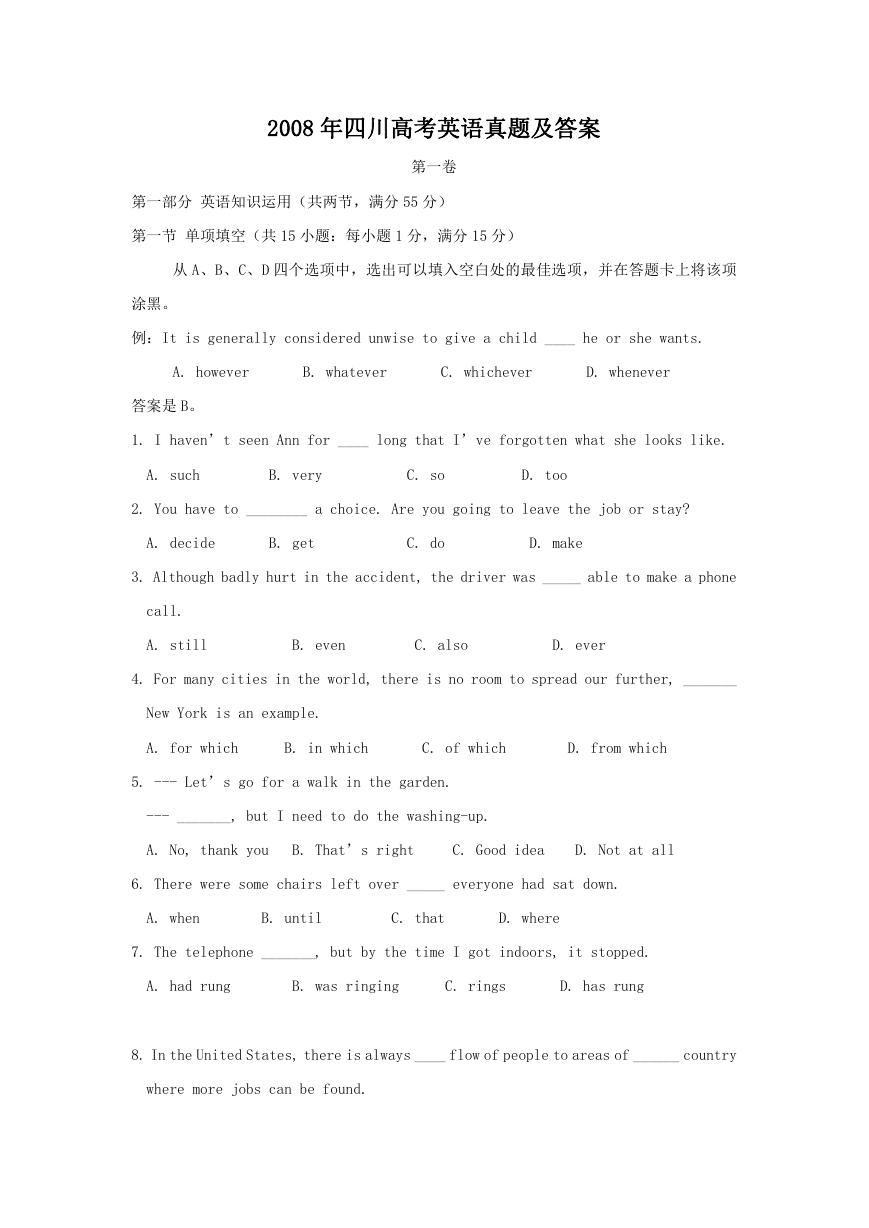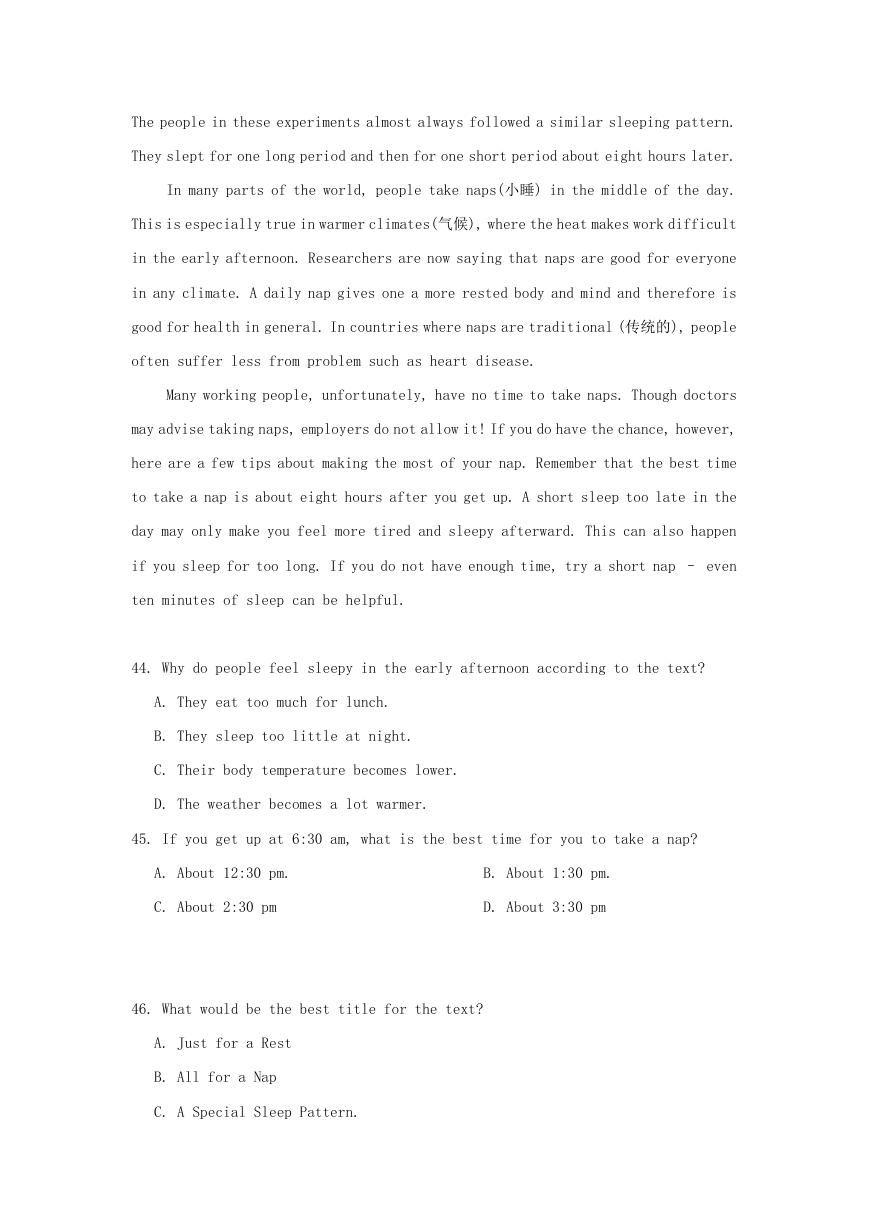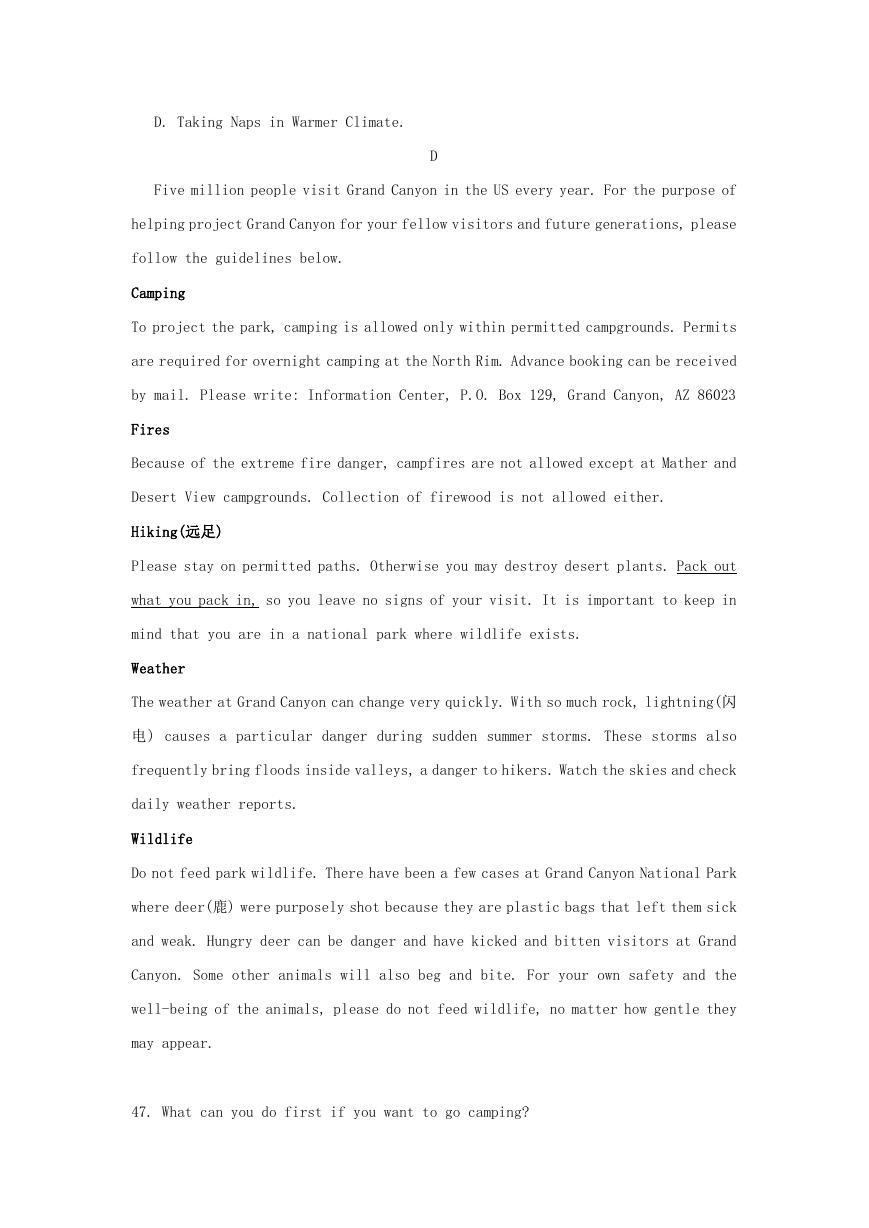2008 年四川高考英语真题及答案
第一卷
第一部分 英语知识运用(共两节,满分 55 分)
第一节 单项填空(共 15 小题:每小题 1 分,满分 15 分)
从 A、B、C、D 四个选项中,选出可以填入空白处的最佳选项,并在答题卡上将该项
涂黑。
例:It is generally considered unwise to give a child ____ he or she wants.
A. however
B. whatever
C. whichever
D. whenever
答案是 B。
1. I haven’t seen Ann for ____ long that I’ve forgotten what she looks like.
A. such
B. very
C. so
D. too
2. You have to ________ a choice. Are you going to leave the job or stay?
A. decide
B. get
C. do
D. make
3. Although badly hurt in the accident, the driver was _____ able to make a phone
call.
A. still
B. even
C. also
D. ever
4. For many cities in the world, there is no room to spread our further, _______
New York is an example.
A. for which
B. in which
C. of which
D. from which
5. --- Let’s go for a walk in the garden.
--- _______, but I need to do the washing-up.
A. No, thank you
B. That’s right
C. Good idea
D. Not at all
6. There were some chairs left over _____ everyone had sat down.
A. when
B. until
C. that
D. where
7. The telephone _______, but by the time I got indoors, it stopped.
A. had rung
B. was ringing
C. rings
D. has rung
8. In the United States, there is always ____ flow of people to areas of ______ country
where more jobs can be found.
�
A. a; the
B. the ; a
C. the; the
D. a; a
9. I used to quarrel a lot with my parents, but now we
fine.
A. look out
B. stay up
C. carry on
D. get along
10. Although this ____ sound like a simple task, great care is needed.
A. must
B. may
C. shall
D. should
11. The manager believes prices will not rise by more than _____ four percent.
A. any other
B. the other
C. another
D. other
12. In some places women are expected to earn money ____ men work at home and raise
their children.
A. but
B. while
C. because
D. though
13. --- Can you show me Mr. Jaffer’s office, please?
--- _____. But I don’t know if he is in at the moment.
A. Thanks
B. Go on
C. Sure
D. You are welcome
14. We had an anxious couple of weeks _____ for the results of the experiment.
A. wait
B. to be waiting
C. waited
D. waiting
15. A cough is usually nothing to worry about unless it lasts for ten days ___.
A. or more
B. instead
C. at most
D. only
第二节 完形填空(共 20 小题:每小题 2 分,满分 40 分)
阅读下面短文,从短文后各题所给的四个选项中,选出可以填入空白处的最佳选项,
并在答题卡上将该项涂黑。
One night I decided to spend some time building a happier and closer
relationship with my daughter. For several weeks she had been 16 me to play chess(棋)
with her, so I suggested a game and she eagerly 17. It was a school night, however,
and at nine o’clock my daughter asked if I could 18 my moves, because she 19 to
go to bed; she had to get up at six in the morning. I 20 she had strict sleeping
habits, 21 I thought she ought to be able to 22 some of this strictness. I said to
her, “23, you can stay up late for once. We’re having 24.” We played on for another
fifteen minutes, during which time she looked 25. Finally she said, “Please, Daddy,
do it quickly.” “No,” I replied. “If you’re going to play it 26, you’re going
to play it slowly.” And so we 27 for another ten minutes, until 28 my daughter burst
�
into tears, and 29 that she was beaten.
Clearly I had made 30. I had started the evening wanting to have a 31 time
with my daughter but had 32 my desire to win to become more 33 than my relationship
with my daughter. When I was a child, my desire to win 34 me well. As a parent, I
35 that it got in my way. So I had to change.
16. A. guiding
B. asking
C. training
D. advising
17. A. allowed
B. expected
C. replied
D. accepted
18. A. change
B. repeat
C. hurry
D. pass
19. A. agreed
B. needed
C. begged
D. hated
20. A. knew
B. learned
C. guessed
D. heard
21. A. so
B. for
C. but
D. or
22. A. put up
B. take up
C. pick up
D. give up
23. A. As usual
B. Go ahead
C. By the way
D. Come on
24. A. patience
B. luck
C. fun
D. success
25. A. excited
B. proud
C. anxious
D. angry
26. A. well
B. again
C. fairly
D. regularly
27. A. discussed
B. continued
C. counted
D. argued
28. A. nervously
B. immediately
C. strangely
D. suddenly
29. A. promised
B. admitted
C. wondered
D. discovered
30. A. a mistake
B. a decision
C. an attempt
D. an effort
31. A. free
B. different
C. full
D. happy
32. A. managed
B. recognized
C. allowed
D. reduced
33. A. important
B. attractive
C. practical
D. interesting
34. A. offered
B. served
C. controlled
D. taught
35. A. realized
B. apologized
C. imagined
D. explained
第二部分 阅读理解(共 20 小题:每小题 2.5 分,满分 50 分)
阅读下列短文,从每题所给的四个选项中,选出最佳选项,并在答题卡上将该项涂黑。
The meaning of the word “volunteer ” may be a little different in different
A
�
countries, but it usually means “one who offers his or her services.” There are
many different ways in which people can volunteer, such as taking care of sick people,
working in homes for homeless children, and picking up garbage(垃圾) from beaches
and parks. Volunteers may work within their own countries or in other countries.
They are often people with a strong wish to help those who are less fortunate than
themselves. Volunteers don’t expect any kind of pay.
At the root of volunteering is the idea that one person may have the ability to
offer services that can help other people. Tracy, a good friend of mine, however,
recently came back from India with a new idea of what being a volunteer means. She
worked for two and a half weeks in one of Mother Teresa’s homes in Calcutta. The
following is her story.
“I first heard about Mother Teresa in my high school, we watched a video(录
像) about her work in India and all over the world. I was so moved by her spirit
to help others and her endless love for every human being that after I graduated
from high school, I too wanted to try her kind of work. So with two friends I flew
to Calcutta for a few weeks.”
“I was asked to work in a home for sick people. I helped wash clothes and sheets,
and pass out lunch. I also fed the people who were too weak to feed themselves and
tried to cheer the up. I felt it was better to share with them than to think that
I have helped them. To be honest, I don’t think I was helping very much. It was
then that I realized that I had not really come to help, but to learn about and
experience another culture(文化) that helped improve my own understanding of life
and the world.”
36. According to the text, a volunteer refers to a person who ______.
A. is willing to help those in need without pay
B. can afford to travel to different places
C. has a strong wish to be successful
D. has made a big fortune in life
37. Tracy started her work as a volunteer _______.
A. after she met Mother Teresa
�
B. after she finished high school
C. when she was touring Calcutta
D. when she was working in a hospital
38. Why did Tracy choose to be a volunteer?
A. She liked to work with Mother Teresa.
B. She had already had some experience.
C. She was asked by Mother Teresa’s example.
D. She wanted to follow Mother Teresa’s example.
39. What is Tracy’s “new idea” (Paragraph 2) of being a volunteer?
A. Going abroad to help the sick.
B. Working in Mother Teresa’s home.
C. Doing simple things to help the poor.
D. Improving oneself through helping others.
B
As nanny(保姆), cook, cleaner, shopper, driver, and gardener, she has one of the
most demanding jobs in Britain today. And paying someone else to do the chores(家
务活) which take the average housewife 71 hours a week would cost €349.
At over €18,000 a year that’s more than the earnings of 70 percent of the
population, including train drivers, firemen, prison officers, and social worker.
Looking after a baby less than a year old takes a housewife into a even higher pay
league. According to a stud, she earns €457 a week – at nearly €24,000 a year,
the same as teachers, engineers, and chemists.
Researchers put a price on each chore, then tried to find out how long the average
person takes doing them. They found housewives spend an average 70.7 hours a week
on housework – with looking after the children (17.9hours) and cooking and cleaning
(12.9 hours each) the most time-consuming(费时).
A wife with a part-time job still works and average of 59 hours a week at home.
Those in full-time employment put in longer hours at home than in the workplace.
The good news is that these hours sharply as children get older. While the average
mother with child under one puts in 90 hours weekly, the figure drops to 80 hours
�
from one to four and to 66 hours from five to ten.
Mother-of-four Karen Williams from London said, “Paying the housewives may not
be practical, but the government should recognize the value of housework, perhaps
through the tax. Running a house takes a lot of time and most husbands don’t
understand this. For example, my husband only puts a shelf up now and again. He never
cleans the kitchen – that’s the real test.”
40. Who earns most according to the text?
A. A social worker.
C. A gardener.
B. A fireman.
D. A teacher.
41. We lean from the text that looking after children ______.
A. takes more time than doing any other housework
B. means more duties than being a teacher
C. requires the mother to be well-educated
D. prevents the mother from working outside
42. According to the text, a housewife with a baby less than one year old may work
_____.
A. 66 hours a week
B. 71 hours a week
C. 80 hours a week
D. 90 hours a week
43. By mentioning her husband, Karen Williams wants to show that ______.
A. housework is no easy job
B. her husband has no time to clean the kitchen
C. a housewife needs to be paid for cleaning
D. the kitchen is hard to clean
C
Are you sometimes a little tired and sleepy in the early afternoon? Many people
feel this way after lunch. They may think that eating lunch is the cause of the
sleepiness. Or, in summer, they may think it is the heat. However, the real reason
lies inside their bodies. At that time – about eight hours after you wake up –
your body temperature goes down. This is what makes you slow down and feel sleepy.
Scientists have tested sleep habits in experiments where there was no night or day.
�
The people in these experiments almost always followed a similar sleeping pattern.
They slept for one long period and then for one short period about eight hours later.
In many parts of the world, people take naps(小睡) in the middle of the day.
This is especially true in warmer climates(气候), where the heat makes work difficult
in the early afternoon. Researchers are now saying that naps are good for everyone
in any climate. A daily nap gives one a more rested body and mind and therefore is
good for health in general. In countries where naps are traditional (传统的), people
often suffer less from problem such as heart disease.
Many working people, unfortunately, have no time to take naps. Though doctors
may advise taking naps, employers do not allow it! If you do have the chance, however,
here are a few tips about making the most of your nap. Remember that the best time
to take a nap is about eight hours after you get up. A short sleep too late in the
day may only make you feel more tired and sleepy afterward. This can also happen
if you sleep for too long. If you do not have enough time, try a short nap – even
ten minutes of sleep can be helpful.
44. Why do people feel sleepy in the early afternoon according to the text?
A. They eat too much for lunch.
B. They sleep too little at night.
C. Their body temperature becomes lower.
D. The weather becomes a lot warmer.
45. If you get up at 6:30 am, what is the best time for you to take a nap?
A. About 12:30 pm.
C. About 2:30 pm
B. About 1:30 pm.
D. About 3:30 pm
46. What would be the best title for the text?
A. Just for a Rest
B. All for a Nap
C. A Special Sleep Pattern.
�
D. Taking Naps in Warmer Climate.
D
Five million people visit Grand Canyon in the US every year. For the purpose of
helping project Grand Canyon for your fellow visitors and future generations, please
follow the guidelines below.
Camping
To project the park, camping is allowed only within permitted campgrounds. Permits
are required for overnight camping at the North Rim. Advance booking can be received
by mail. Please write: Information Center, P.O. Box 129, Grand Canyon, AZ 86023
Fires
Because of the extreme fire danger, campfires are not allowed except at Mather and
Desert View campgrounds. Collection of firewood is not allowed either.
Hiking(远足)
Please stay on permitted paths. Otherwise you may destroy desert plants. Pack out
what you pack in, so you leave no signs of your visit. It is important to keep in
mind that you are in a national park where wildlife exists.
Weather
The weather at Grand Canyon can change very quickly. With so much rock, lightning(闪
电) causes a particular danger during sudden summer storms. These storms also
frequently bring floods inside valleys, a danger to hikers. Watch the skies and check
daily weather reports.
Wildlife
Do not feed park wildlife. There have been a few cases at Grand Canyon National Park
where deer(鹿) were purposely shot because they are plastic bags that left them sick
and weak. Hungry deer can be danger and have kicked and bitten visitors at Grand
Canyon. Some other animals will also beg and bite. For your own safety and the
well-being of the animals, please do not feed wildlife, no matter how gentle they
may appear.
47. What can you do first if you want to go camping?
�
















 2023年江西萍乡中考道德与法治真题及答案.doc
2023年江西萍乡中考道德与法治真题及答案.doc 2012年重庆南川中考生物真题及答案.doc
2012年重庆南川中考生物真题及答案.doc 2013年江西师范大学地理学综合及文艺理论基础考研真题.doc
2013年江西师范大学地理学综合及文艺理论基础考研真题.doc 2020年四川甘孜小升初语文真题及答案I卷.doc
2020年四川甘孜小升初语文真题及答案I卷.doc 2020年注册岩土工程师专业基础考试真题及答案.doc
2020年注册岩土工程师专业基础考试真题及答案.doc 2023-2024学年福建省厦门市九年级上学期数学月考试题及答案.doc
2023-2024学年福建省厦门市九年级上学期数学月考试题及答案.doc 2021-2022学年辽宁省沈阳市大东区九年级上学期语文期末试题及答案.doc
2021-2022学年辽宁省沈阳市大东区九年级上学期语文期末试题及答案.doc 2022-2023学年北京东城区初三第一学期物理期末试卷及答案.doc
2022-2023学年北京东城区初三第一学期物理期末试卷及答案.doc 2018上半年江西教师资格初中地理学科知识与教学能力真题及答案.doc
2018上半年江西教师资格初中地理学科知识与教学能力真题及答案.doc 2012年河北国家公务员申论考试真题及答案-省级.doc
2012年河北国家公务员申论考试真题及答案-省级.doc 2020-2021学年江苏省扬州市江都区邵樊片九年级上学期数学第一次质量检测试题及答案.doc
2020-2021学年江苏省扬州市江都区邵樊片九年级上学期数学第一次质量检测试题及答案.doc 2022下半年黑龙江教师资格证中学综合素质真题及答案.doc
2022下半年黑龙江教师资格证中学综合素质真题及答案.doc